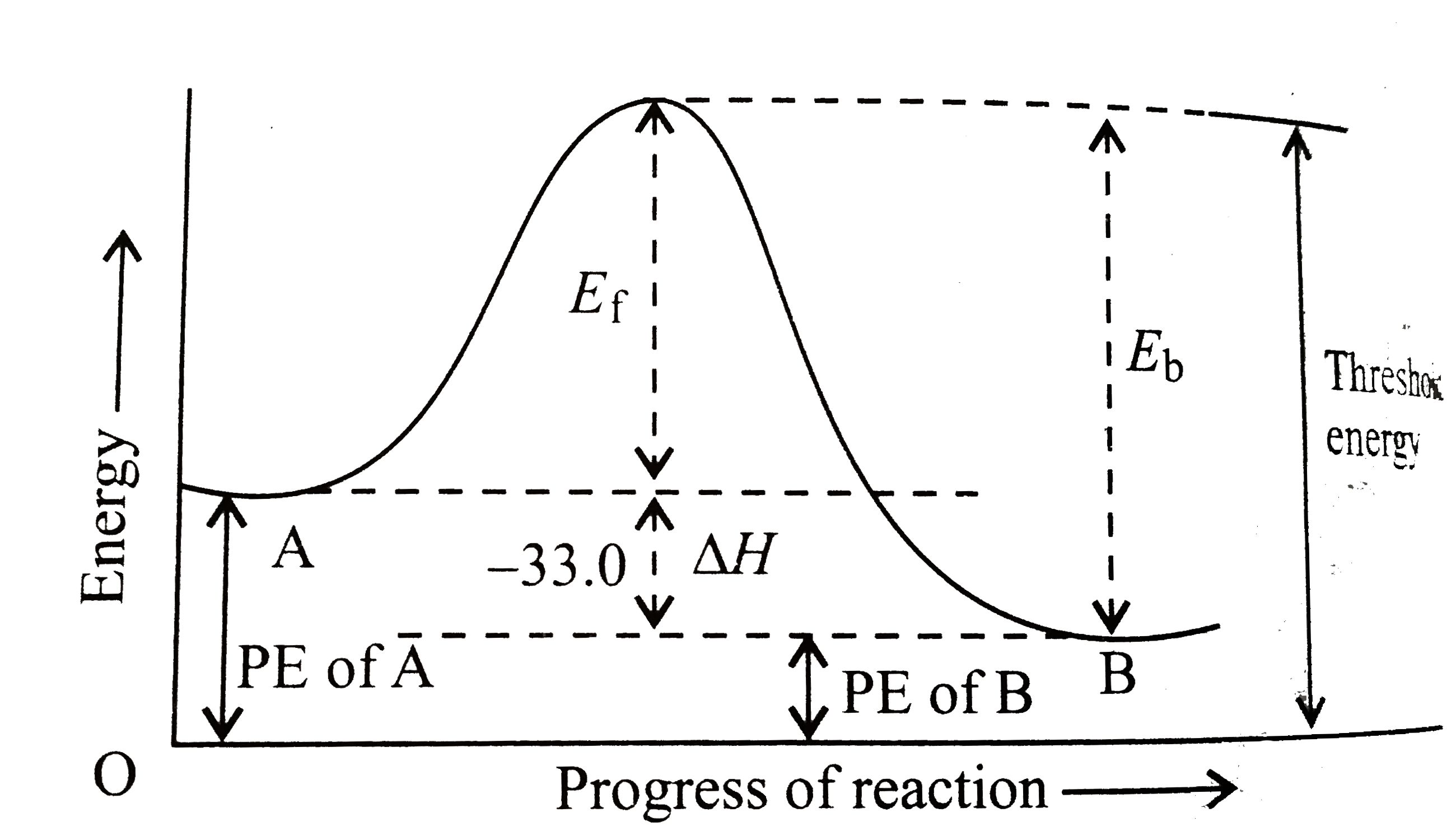In terms of rate constants for forward and backward reactions (kfandkb) , equilibrium constant of a reaction is equal to …………..
The correct Answer is:kf/kb
To find the equilibrium constant K in terms of the rate constants for the forward and backward reactions (kf and kb), we can follow these steps:
1. Understand the Reaction:
Consider a general reaction at equilibrium:
A+B⇌C
Here, A and B are reactants, and C is the product.
2. Define Rate Constants:
- Let kf be the rate constant for the forward reaction (where A and B form C).
- Let kb be the rate constant for the backward reaction (where C decomposes back into A and B).
3. Write Rate Expressions:
- The rate of the forward reaction can be expressed as:
Rateforward=kf(A)(B)
- The rate of the backward reaction can be expressed as:
Ratebackward=kb(C)
4. Establish Equilibrium Condition:
At equilibrium, the rate of the forward reaction equals the rate of the backward reaction:
kf(A)(B)=kb(C)
5. Rearranging for Equilibrium Constant:
Rearranging the above equation gives:
(C)(A)(B)=kfkb
6. Define the Equilibrium Constant:
The equilibrium constant K (or Kc for concentrations) is defined as:
K=(C)(A)(B)
7. Final Expression:
Therefore, we can express the equilibrium constant in terms of the rate constants:
K=kfkb
Final Answer:
The equilibrium constant of a reaction is equal to:
K=kfkb
Consider a general reaction at equilibrium:
A+B⇌C
Here, A and B are reactants, and C is the product.
- Let kf be the rate constant for the forward reaction (where A and B form C).
- Let kb be the rate constant for the backward reaction (where C decomposes back into A and B).
- The rate of the forward reaction can be expressed as:
Rateforward=kf(A)(B)
- The rate of the backward reaction can be expressed as:
Ratebackward=kb(C)
At equilibrium, the rate of the forward reaction equals the rate of the backward reaction:
kf(A)(B)=kb(C)
Rearranging the above equation gives:
(C)(A)(B)=kfkb
The equilibrium constant K (or Kc for concentrations) is defined as:
K=(C)(A)(B)
Therefore, we can express the equilibrium constant in terms of the rate constants:
K=kfkb
The equilibrium constant of a reaction is equal to:
K=kfkb
Topper's Solved these Questions
- EQUILIBRIUM IN PHYSICAL AND CHEMICAL PROCESSESBOOK - PRADEEPCHAPTER - EQUILIBRIUM IN PHYSICAL AND CHEMICAL PROCESSESEXERCISE - CONCEPTUAL QUESTIONS
21 Videos
- EQUILIBRIUM IN PHYSICAL AND CHEMICAL PROCESSESBOOK - PRADEEPCHAPTER - EQUILIBRIUM IN PHYSICAL AND CHEMICAL PROCESSESEXERCISE - NCERT QUESTIONS AND EXERCISES WITH ANSWERS
34 Videos
- EQUILIBRIUM IN PHYSICAL AND CHEMICAL PROCESSESBOOK - PRADEEPCHAPTER - EQUILIBRIUM IN PHYSICAL AND CHEMICAL PROCESSESEXERCISE - TEST YOUR GRIP (MULTIPLE CHOICE QUESTIONS)
15 Videos
- EQUILIBRIUMBOOK - PRADEEPCHAPTER - EQUILIBRIUMEXERCISE - Competition Focus (VIII. Assertion-Reason Type Questions)
16 Videos
- HYDROCARBONSBOOK - PRADEEPCHAPTER - HYDROCARBONSEXERCISE - Competition Focus (JEE(main and advanced)/Medical Entrance) VIII. ASSERTION - REASON TYPE QUESTIONS
31 Videos
Similar Questions
Knowledge Check
K1 and K2 are the rate constants of forward and backward reactions. The equilibrium constant K of the reaction is -
AK1×K2BK1−K2CK1K2)DK1+K2K1−K2k1andk2 are the velocity constants of forward and backward reactions. The equilibrium constant K of the reaction is
Ak1×k2Bk1−k2Ck1/k2Dk1+k2k1−k2In a reaction A+B⇔C+D the rate constant of forward reaction & backward reaction is K1 and K2 then the equilibrium constant (K) for reaction is expressed as:
AKc=K2K1BKc=K1K2CKc=K1×K2DKc=K1+K2
The equilibrium constant (K) of a reaction may be written as
View SolutionKf and Kb are the velocity constants of forward and backward reactions. The equilibrium constant Keq of the reversible reaction will be
View SolutionThe energy change accompanying the equilibrium reaction A⇔B is −33.0kJmol−1.

Assuming that pre-exponential factor is same for forward and backward reaction answer the following:
The equilibrium constant k for the reaction at 300K
View SolutionThe rate constans of forward and backward reactions are 8.5×10−5 and 2.38×10−4 respectively. The equilibrium constant if
View SolutionWhich of the following relative value of kf (rate constant of forward reaction) and kb (rate constant of backward reaction) results in an equilibrium mixture that contain large amount of reactants and small amounts of products?
View Solution
